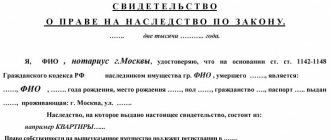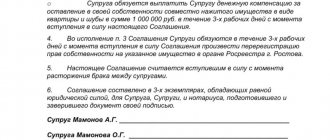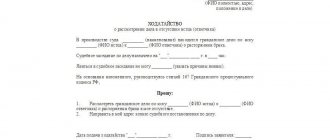In order to understand whether property received as a gift during marriage is divided during a divorce, you need to know the legal features of the gift agreement, the list of persons who can give things as a gift and can accept them, the rules of the Family Code regulating the status of donated things, as well as provisions of judicial practice that clarify the most difficult issues regarding the division of donated property.
Only by understanding these issues can you be sure that the problems of dividing the property donated as a gift will be successfully resolved by you upon termination of family relations with your spouse.
Separately, it should be noted that people often confuse donation and inheritance. It is necessary to understand that the transfer of the property mass by inheritance is carried out only after the death of the testator under the conditions determined by him in the will, or in accordance with the norms of inheritance legislation.
A donation involves the transfer of a thing from the property of the donor to the property of the donee free of charge during the life of the donor and can be canceled by the donor in some cases established by Article 578 of the Civil Code.
Is property accepted as a gift subject to division?
Article 36 of family law defines a ban on the distribution of ownership rights to objects accepted as a gift by one of the spouses. Property donated to a husband or wife cannot be divided, either before the marriage is registered or after the creation of a family.
That is, if the property was received by a citizen under a gift agreement, then it may remain in his personal property for the rest of his life. Proceedings of marriage and divorce are not taken into account.
But it is worth keeping in mind that if the spouse was given property that is subject to mandatory state registration, then a gift agreement will be required. It should be concluded by a notary. At the next stage, the citizen who has accepted the property as a gift will be able to register ownership on the basis of an agreement.
Sometimes relatives contribute to a gift to the family, and the contribution of each of them can vary significantly in amount. In this case, the gifted object cannot be considered the personal property of either spouse.
What is considered a gift
According to legal canons, it is considered that the receipt of a gift is considered accomplished when:
- there is a transfer of something considered a gift under a written gift agreement or by oral notification;
- someone receives a prize when participating in a drawing, promotion, contest or competition.
In this case, the fact of transfer of a gift can be:
- With the preparation of a simple or notarized written agreement. Such a gift is confirmed quite easily; you just need to provide a deed of gift.
- Through the simple presentation of a gift, both in front of witnesses and without them. Proving the fact of a gift in such circumstances is extremely difficult; here, proof will require the testimony of the donor himself, physical evidence, for example, an engraving on the gift, which will clearly indicate to whom the gift is intended, or other evidence.
Division of donated property
During the dissolution of a marriage relationship and the distribution of ownership rights to jointly acquired property, items accepted as a gift are not subject to division. However, exceptions may apply for some properties and situations.
Spouses can independently formalize the division or transfer of ownership of the donated property. Such a condition may be indicated in an agreement on the division of property or in a marriage contract. For example, a wife can give her husband a car as compensation for a share in the apartment where she stays with the children.
Gifting after divorce
Can one of the spouses donate living space after a divorce? Maybe if she is solely his property (for example, a gift in which the spouses did not make impressive improvements, such as major renovations, that affect the cost of square meters).
In any other cases, when this living space is jointly acquired property , any legal action with it can only be carried out by mutual decision.
Therefore, when making a gift, selling, etc., if the area was not divided , say, under a marriage contract, you must first obtain a document confirming the consent of the former spouse to the transaction.
Without this consent, only what is directly the property of the citizen can be transferred. For example, part of the apartment was allocated to him as a result of the division of property.
He can give it as a gift without asking anyone. At the same time, when re-registering ownership in the Cadastral Chamber, documents confirming the allocation of the share .
The law does not establish any framework regarding the recipient of the gift - a person can give his thing to anyone.
However, there is one caveat - if the recipient is someone not related to the giver by close kinship (close relatives are father, mother, sister, brother, spouse, grandmother, grandfather, child), then you will have to pay a tax of 13% of the value of the fatera.
How is donated living space divided during a divorce?
When donated property is subject to division
If real estate or other property was gifted to one of the spouses, then it is personal property. But if during the existence of the marriage the value of the donated object has increased significantly due to the investment of funds, repairs and reconstruction, then the donated object will be recognized as joint property. During a divorce, the gifted property will have to be divided.
If one of the spouses received housing as a gift, the second partner will be able to claim real estate during a divorce if:
- redevelopment of a residential property was carried out;
- additional premises were added to the donated living space;
- expensive repair work was carried out;
- The living space has undergone technical re-equipment.
Donated living space can be recognized as joint property only by a court decision. The interested party should file a corresponding claim. It will need to be accompanied by documentation proving a joint contribution to the donated apartment, as a result of which the cost of housing has increased significantly.
In addition, the plaintiff must document that the initial price was significantly lower than the price at which the property is valued after the work has been completed.
The evidence base may include the following documents:
- certificates of an independent assessment of real estate before the start of modernization work and after it has been carried out;
- contracts for repair and other work with contractors;
- receipts, checks and other documentation confirming the purchase of materials for housing reconstruction;
- witness's testimonies.
Gift or not a gift?
In order for a gift not to be included in the list of common property, its owner must provide in court significant evidence (preferably documentary) of the fact of the gift.
The law requires that civil transactions (and donation falls into the category of civil transactions) be formalized in writing if the amount of the agreement (in our case, the donated property) exceeds 10,000 rubles.
This applies not only to real estate, cars, equipment, luxury goods, but also to all property. The fact of donation is confirmed by a written and notarized agreement.
If the husband gave his wife items for personal use (clothing, shoes, perfume, jewelry), most likely the ownership will not be disputed. However, if an expensive item that is not an item for personal use (car, laptop, phone) is presented as a gift, the other half will have to prove that it is a gift.
Agree, husband and wife rarely enter into gift agreements. And if during a divorce in court the spouse testifies that the item was not a gift at all, but is joint property, it is difficult for the other party to prove the opposite. For this reason, you need to be mentally prepared to share such a gift.
What can be shared and what cannot be shared
Property donated to spouses is divided into 2 categories:
- gifts that are not divided at all;
- property that can be divided in some cases.
The following property is not subject to division:
- things that the recipient used personally (with the exception of jewelry);
- objects donated before marriage;
- property given as a gift to one of the spouses, which cannot be improved by investing money;
- property subject to division under the terms of a marriage agreement or contract.
The donated property is subject to division if:
- the gift was intended for both spouses;
- donated property, which has significantly increased in value after the joint contribution of the spouses;
- The joint actions of the spouses allowed one of them to receive a prize or cash gain.
Wedding gifts: general or personal?
A mountain of wedding gifts for newlyweds is a pleasant thing. They are accepted together, they are also used together. However, during a divorce, the property donated for the wedding does not seem so common.
Spouses often divide gifts according to the principle: “my relatives or friends gave them, so it’s mine.” But in the case of division, it does not matter whose friends or relatives gave the gift. It is important to whom the property is donated - one of the representatives of the married couple or both. In most cases, a wedding gift is given to the newlyweds, and this is a wedding tradition.
Thus, the gifted property is joint and subject to division in case of divorce. However, if the spouse proves that the gift was presented to him personally at the wedding, the property will be recognized as personal property.
It is not easy to prove a gift to the court in such a situation. Evidence may include testimony from donors, other persons present during the donation, physical evidence (for example, an expensive watch with a dedicatory inscription), written evidence (donation agreement).
If there is documentary evidence of the fact of donation, the court does not take into account the testimony. Let's give an example: a young couple received an apartment as a gift from the groom's parents. Before the wedding, a deed of gift was drawn up, and at the wedding it was solemnly announced that the apartment was a gift to the newlyweds. During a divorce, the wife will not be able to claim rights to the apartment, since the living space is the personal property of the husband. A declaration of a gift made at a wedding will have no evidentiary value.
Subtleties of dividing donated property
If the plaintiff’s demands to recognize the donated property as joint property are satisfied, then it is worth preparing for the fact that the gift will not be divided into equal parts.
The larger share will go to the spouse who:
- paid current bills and debts from personal money;
- intends to live with the children after the divorce, etc.
A decrease in the share in property that is recognized as joint property should be expected in the following cases:
- if the spouse does not have a job or income without good reason;
- if the spouse treated the property inappropriately, which resulted in its damage.
In order to avoid lengthy legal disputes, spouses must enter into an agreement. It can specify any methods of dividing property that satisfies both parties.
Housing received as a gift
Circumstances sometimes develop such that close relatives give us their home by drawing up a deed of gift. This type of transaction is disinterested and does not bring profit to the donor. In this case, the donee is not a debtor to the donor. Therefore, such a transaction if there are blood ties is not subject to taxation.
Otherwise, a situation arises when a gift transaction is made between people who are not related by blood. The recipient will be required to pay a state fee of 30% of the value of the gift. At the same time, the sale of a gift during the first three years will also be subject to state taxes.
Considering donated housing (property) in the light of the dissolution of family ties, the legislation has a clear position in this regard - property, real estate or land received under a gift agreement are considered personal property and cannot be divided during a divorce. The date of marriage registration (before or after receiving the gift) does not matter.
Moreover, after a divorce, the owner of the gift house can write the ex-spouse out of it and force him to leave the area where he previously lived.
Wedding gifts
Many divorcing spouses have disputes over the division of property given as a wedding gift. Divorcing people begin to remember who exactly gave the item and to whom it was intended.
In most cases, wedding gifts are intended for both newlyweds, not just one. For this reason, wedding gifts are often considered community property. But there are also exceptions. For example, the wife's parents gave the newlyweds a car. The deed of gift is issued to the daughter, so the car will be considered her personal property.
Also, a wedding gift can be recognized as personal property if one of the spouses provides evidence that the property was intended specifically for him. In this case, division of the donated object is impossible.
Various property
Real estate and apartment
Is it possible to divide a donated apartment during a divorce or not? Family law establishes that if an apartment was given as a gift during marriage, it cannot be divided during a divorce, with the exception of several cases:
- The housing was remodeled or refurbished through the joint efforts of family members, which ultimately led to an increase in the value of the property.
- The home was extensively renovated using the labor or funds of both spouses, which led to an increase in the price of the apartment or house.
- The purpose of real estate was changed, which led to its rise in price.
Land plot
Donated land may be included in the property mass to be divided upon termination of marriage if:
- It has been renovated or new properties built through the efforts of both husband and wife, which have increased the value of the piece of land.
- It was cleared of debris, stones and unusable structures.
- The land went through reclamation and the process of draining swamps, which ultimately increased its attractiveness and value.
Automobile
A car given to one of the participants in a marriage can be considered jointly acquired property if:
- The couple invested together in its major renovation.
- The wife and husband jointly paid for expensive tuning of the body, chassis or engine.
- The spouse, who is not the donee under the deed of gift, repaired the car after an accident that occurred due to the fault of the donee spouse.
Money
With regard to funds, Russian legislation is unambiguous and categorical: they belong only to the recipient spouse and cannot become the subject of a dispute about the division of property upon dissolution of the marital relationship.
Luxuries
Before moving on to the question of how luxury goods are divided between participants in a marriage during a divorce, it is necessary to define the concept of “luxury goods”.
There is no specific definition of this concept in Russian legislation, however, from the spirit of Article 446 of the Civil Procedure Code of Russia it follows that luxury goods are things that a person can easily do without, they are not among the necessities of life and are aimed at satisfying aesthetic or intellectual needs .
According to the general rule established in the thirty-sixth article of the Family Code, these items are recognized as joint property. However, it should be borne in mind that the recognition of any thing as a luxury item largely depends on what the total income of the spouses was during the marriage and what lifestyle they followed. For example, for a successful entrepreneur whose monthly profit is ten million rubles, a diamond necklace that he gives as a gift to his wife is unlikely to be a luxury item. At the same time, in a family with an income of thirty thousand rubles a month, a car will be considered a luxury.
In this regard, this issue is left to the discretion of the judge, who, having assessed all the criteria, must make a decision whether the disputed item is a luxury item or not.
Subtleties of registration of donation
This chapter provides recommendations by following which you will be able to determine in advance the fate of the property gifted to you or your spouse, and you will also learn how to correctly draw up a deed of gift in order to be able to use a written document as evidence in case of litigation.
Marriage contract
A prenuptial agreement is a reasonable way to determine in advance the fate of the gifts received by the spouses, so as not to begin long and exhausting legal proceedings in the event of divorce in the future. As a rule, most contracts stipulate the following clauses:
- Gifts given to both spouses are considered their joint property.
- Gifts given to the wife pass to her after the divorce.
- Gifts given to the husband are transferred to him after the divorce.
Based on the analysis of judicial practice, it is not recommended to include a provision in the contract that secures the right of one of the participants in the marriage union to all gifts received by both spouses. Often, judges recognize this provision as invalid, citing the fact that it violates the rights of the other spouse.
Donation agreement
When you receive things as a gift, do not forget to put the following rules into practice:
- If the price of the gift exceeds 3,000 rubles, then make sure that the contract is drawn up in writing. This will help you in case of division of family assets in court.
- Be sure to register the property gifted to you with Rosreestr. Until you do this, it will not be considered your personal property.
- If you have been given money as a gift and you use it to purchase housing, luxury goods, a car and other expensive property, then make sure to include a clause in the purchase and sale agreement stating that this property was purchased with your personal money. Thus, in court you will have evidence that the item was purchased with your personal money and not purchased with joint funds.
Formalization of the agreement
In the absence of disagreements and to save time and nerves, spouses can enter into an agreement on the division of jointly acquired and personal property upon dissolution of the marital relationship. The document requires mandatory notarization.
Among the advantages of a property division agreement, the following features stand out:
- In accordance with the terms of the document, both jointly acquired property and individually acquired property can be divided.
- To divide property, it is not necessary to prove the fact of its joint ownership by the spouses. It is enough to simply reach an agreement.
- Any type of property (donated items, inherited, personal property) can be divided. A spouse may transfer such property to his or her partner in lieu of other joint property and for other reasons.
The document on division of property must contain the following data:
- Full names of the parties to the agreement, their passport details, registration addresses;
- dates of registration and dissolution of marriage relations;
- property that needs to be divided between spouses;
- expression of will of the parties to the agreement regarding the transfer of ownership rights to the property.
The document is signed in the presence of a notary and certified by him. Before this, the notary must check the legal capacity of the divorcing couple.
Registration of deed of gift
In order for the recipient to be maximally protected by law during a divorce, it is important to draw up a deed of gift correctly. A number of features of concluding a gift agreement should be taken into account. First, we determine the circle of people from whom we can legally receive gifts
Who cannot be a donor:
- Citizens recognized by law as incompetent or limited in rights.
- Children under 14 years of age, without the consent of their legal representatives.
Who can't accept gifts?
- Citizens performing public service from persons who are clients.
- Social workers.
- Health and education staff.
The gift agreement can be drawn up in writing, signed. Notarization is not required, but for peace of mind you can do it. After concluding the contract, you must contact Rosreestr with a package of documents to register the transfer of the right to the donated housing.
Judicial procedure for division of property
If it is not possible to reach an agreement on the division of the gifted and joint property, then you will have to go to court. In this case, everything will depend on the court's decision. Based on the evidence presented by the parties, the judge will decide which property is jointly acquired and which is personal. And on the basis of a court order, the parties are obliged to divide the property.
The spouse should prepare for the fact that the partner may resort to the use of fraudulent schemes in order not to subject the property to division.
Gift improvement
As an exception, a gift may be recognized as common property and divided. This is possible if, at the expense of common funds or the personal funds of the second spouse, the gift was improved, significantly increasing its value. Expenses for improving the gift must be documented - in accordance with Art. 37 RF IC.
For example , my husband received a village house as a gift from his grandparents. Using common family funds, the house was remodeled, major repairs were made, the second floor with an attic was completed, and the area around the house was landscaped. The house, which cost a penny, turned into a solid, expensive house. Of course, this house will be recognized as the common property of the spouses, although it was originally the personal property of the husband.
Important! The spouse, whose personal funds (or share of common funds) were used to improve the gift, has the right to demand that not the entire gift be recognized as common, but only a part corresponding to the cost of the improvements made.
To determine which part of the gift belongs to the spouse-owner, and which part belongs to both spouses by right of joint ownership, an expert assessment of the gift is carried out. The original cost of the gift is subtracted from the amount received, and the remaining amount is divided between the spouses (if they improved the gift with common funds) or transferred to the second spouse (if the improvement was made using his personal funds).
Do spouses share gifts with each other?
Property given by one spouse to the other is intended for personal use. Such property is considered personal and cannot be divided. But for this the following conditions must be met:
- the gift is not a piece of jewelry or a luxury item;
- the item is used exclusively by the spouse to whom it was given.
In accordance with Part 2 of Art. 36 of family law, jewelry and luxury items are jointly acquired property even if the husband gave them to his wife (or vice versa). Therefore, upon divorce, such items are subject to division.
How are gifts divided in a divorce?
When can I split?
The gift agreement in the form in which the legislator executed it and enshrined it in the Civil Code of Russia will be a classic unilateral gratuitous transaction. The properties of the deed of gift are described in more detail in the table below.
| Legal properties of the gift agreement | Property Explanation |
| Unilateralism | It means that to make a gift, the will of only one party to the transaction, namely the donor, is sufficient, and the consent of the donee is not required. |
| Gratuitous | This is the property of an agreement in which one of its parties provides something to the other party to the transaction without payment or other counter-representation, for example, the transfer of property in kind. |
Based on the legal features of donation and the provisions of the law specified in the thirty-sixth article of the Family Code and prescribing that any things and valuables received by him under a gratuitous transaction, including under a gift agreement, are considered personal assets of a spouse, it should be noted that, as a general rule, donated property cannot be included in the list of things to be divided in the event of divorce.
However, as often happens, many rules have exceptions, and the provisions of the thirty-sixth article of the Family Code are not unique in this case.
Gifts received by participants in a marriage can be
divide in the following cases:
- If, according to the terms of the deed of gift, both spouses acted as donees. For example, if, as a wedding present, the parents gave the newlyweds an apartment and wrote out a corresponding gift agreement for it, where they indicated both spouses as recipients, then after issuing a certificate of ownership, the residential premises will be considered a joint asset of the wife and husband. Therefore, in this case, the answer to the question of whether to consider the donated apartment as jointly acquired property will be positive.
- If the gift has been repaired or reconstructed at the expense of financial resources or the efforts of both participants in the family relationship, as a result of which its value has increased significantly. For example, if a wife received as a gift a car that was damaged as a result of an accident, and then the spouses together put it in order and repaired it, then the car, according to the requirements of the law, will become their joint property.
- Prizes and other winnings that were received by one of the participants in a family union, but on the basis of the common property of the spouses. To better understand the meaning of the norm, imagine this situation: the spouses bought a home with common funds and registered it in the wife’s name. After some time had passed, they learned that the administration of the locality in which they live had organized a competition for the most interesting decoration of the balcony. The husband, who is a graphic designer by profession, took a creative approach to the task and made a work of art out of the balcony. Based on the results of the competition, the family was awarded a prize for first place, for example, kitchen furniture. This kitchen will be considered a joint asset, since the basis on which the spouses could take part in the creative competition is their apartment, purchased with common funds, even though the wife, according to the documents, is the sole owner of the home.
Therefore, in a common life situation where a husband has given his wife an apartment, whether it is divided during a divorce or not depends on how much effort or personal finance he has put into making the value of the home increase.
When you can't divide
It is strictly forbidden to recognize the following assets that were received as gifts as joint property:
- Exclusive rights transferred to one of the spouses for a literary work, a work of art or music, etc.
- Items considered personal use, such as cosmetics, jewelry, shoes and clothing. However, the law does not allow luxury goods to be classified in this category.
- Gifts, the fate of which after the termination of the marriage relationship has already been determined in the marriage contract or in an agreement confirming the division of property and certified by a notary.
- A gift that one of the participants in a family union took ownership of before marriage and which cannot be restored, repaired or otherwise improved in order to increase its value.
- An item acquired as a gift during marriage and not subject to restoration, repair or other improvement in order to increase its value.
Disputes and judicial practice
Disputes that arise between participants in a marriage relationship regarding the future fate of things acquired by gift can be resolved in two main ways, discussed in detail below in the table.
| Dispute resolution method | Dispute resolution procedure |
| Mutual agreement | The dispute is resolved by one of the two options below:
|
| Court | Resolves disputes between parties to a marriage if they have not voluntarily reached an agreement with each other, and determines the fate of assets after the end of the marriage. The plaintiff in such a lawsuit, as a rule, is the spouse who demands that the fact of the gift to the other participant in the marriage not be recognized and that this thing be declared jointly acquired property that is subject to division. |
In most cases, litigation in court revolves around the division of housing that was donated by one of the parents to a young family or purchased with money donated by the parents.
One of the cases in this category was before the Supreme Court of Russia. The plot of the dispute is as follows: the mother of the future wife gave her money and formalized the gift using a deed of gift. An apartment was bought with this money during marriage. The housing was registered in the name of a wife and husband.
A few years later, family ties began to crack, and the couple decided to divorce.
It was not possible to reach an amicable agreement and divide the property, so they had to resolve this issue in court. The plaintiff, represented by the ex-husband, demanded to know whether the donated apartment was jointly acquired property. In turn, the wife argued that the man who was previously her husband could not claim a share exceeding 1/15 of the apartment, since he paid for the property a sum of money equivalent to this share.
At first, the district court and the regional court agreed with the husband’s arguments and satisfied his claims to half of the apartment.
However, the Supreme Court did not agree with such a decision, pointing out that if spouses bought or sold property during marriage, this does not automatically make the thing or the money received from its sale their joint property. In other words, in such court cases it is necessary to find answers to two important questions:
- Was the item or value that the spouses plan to share purchased with common or personal funds?
- Under what kind of transaction was the money transferred: gratuitous or compensated?
Based on the answers received, the judges of the Supreme Court had to decide whether it is possible to divide the gifted apartment during a divorce or is it unacceptable in this case? The court concluded that the funds were received under a written gift agreement, i.e. free of charge, which means they personally belong to the wife. Since most of the apartment was purchased during the marriage, but with the spouse’s personal money, this fact does not allow the property to be recognized as a joint asset. It follows that the ex-husband's claims must be rejected.
Are gifts subject to division?
Often a wedding gift can be presented in the form of a refrigerator, TV or dinner set. It could be an apartment, a car or a plot of land. How in this situation
Is property division being carried out?
In this regard, the legislator clearly states that in case of divorce, the division of gifts is not provided for.
Divorcing spouses quite often both express claims against the opposite party, challenging property rights in relation to a particular gift. It can be difficult to prove this with compelling arguments.
How to divide a donated apartment
Gifted property during a divorce can be divided on the basis of an individual agreement concluded between the spouses. In this case, the presence of other permissive circumstances is not mandatory. Property can be divided in any ratio specified in the agreement.
Even when drawing up a divorce agreement on the division of personal property, spouses must contact the judicial authorities. An affirmative decision of the court is the basis confirming the property rights of each of the spouses in the future.
Division of a donated apartment by agreement
The division of real estate that was gifted to one of the spouses by mutual consent is an exclusive right. It can be used by the parties at any time during the divorce process.
In such situations, legislative provisions only protect the rights of joint children who have not reached the age of majority. Their share, which officially belongs to them, cannot be divided between spouses.
Division of a donated apartment through the court
When turning to a judicial authority with a question about the division of gifted property, it is necessary to prove the validity of the requirements for division. Confirmation of investments of joint funds or other grounds is accepted as evidence.
Factors confirming the possibility of recognizing gifted property as common may be individual, depending on the circumstances of the situation. The decision to assign one or another status is made exclusively by the court. In this case, the court is not obliged to recognize personal property as joint, but has the legal right to do so.
Features of donation as a transaction
The main feature of the gift agreement is the gratuitous factor. When receiving movable or immovable property as a gift, a citizen is not obliged to in any way reimburse the cost of the gift. If the fact of compensation has taken place, the donation transaction acquires the status of a purchase and sale, in respect of which other legislative provisions apply.
Receiving a gift is not an obligation, so the recipient can initiate refusal in two ways:
- Draw up an official document containing the refusal wording;
- Do not take actions aimed at re-registration of property rights.
In the first case, for legal force, the document must be officially registered. In the second case, the absence of a change in the registration of property rights leads to the fact that the gift remains in the possession of the donor.
Any property received as a gift is personal from the point of view of the law. Under normal circumstances, it cannot be recognized as common or jointly acquired, which directly applies to property received by inheritance.
Disputes about the division of gifts
Husband and wife solve the problem of dividing gifts in two ways:
Mutual agreement, which resulted in:
- voluntary distribution of property is carried out with or without re-registration of property (unless this is required by law). That is, the property is simply registered in the general manner, as an ordinary transaction in the name of another person;
- A notarized agreement on the division of property is drawn up.
Litigation about what property is subject to division:
This happens when there is no agreement in opinions and the relationship between former spouses is very tense. Wherein:
- the spouse who proves that the property is a gift (correspondingly belonging to him) tries to remove the property that has become the subject of the claim from division. To achieve this, citizens resort to tricks and conspiracy. Example : after a divorce, a wife filed a claim for division of property and asks to divide expensive household appliances and furniture. During the marriage, the wife did not work and, accordingly, the husband furnished the apartment with his own earned money. He is annoyed by such injustice that the plaintiff, without investing a penny, lays claim to a good half. According to the law, he has no chance, and then he persuades his friend to draw up a fake agreement on donating money to buy furniture and equipment. Thus, the defendant makes an attempt to prove to the court that the subject of the dispute is essentially a gift that is indivisible. But the court treats such evidence with distrust and the defendant is unlikely to achieve victory in the case.
- Whoever tries to refute the fact of donation or proves that property during the marriage became common is most often the plaintiff who wants a fair division.










